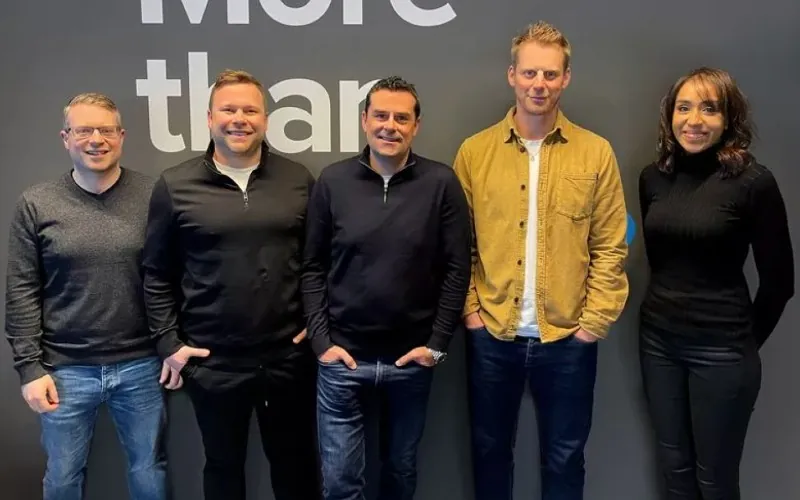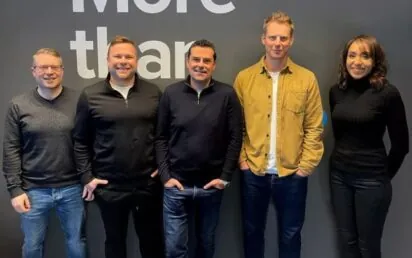It’s just over three years since Orka announced an eye-watering £29m investment round.
The Manchester startup, formerly known as Broadstone, was a market leader in providing tech solutions for shift workers.
It was launched in 2016 by James Doyle, Nick Groves and Tom Pickersgill, who shared a belief that the traditional recruitment and staffing agency model was broken.
As the investor money poured in, Orka launched more tech solutions to transform the way hourly paid workers were able to work and get paid.
Pickersgill became the public face of the company.
A former professional footballer he played for Morecambe as a youngster before heading to Indiana University in the US to read business management on a full scholarship.
Over the years Orka launched a series of tech solutions – Orka Works, Orka Pay and Orka Check – that appealed to an increasingly tech-enabled workforce seeking a flexible work life.
Orka Works was an the app where workers could find and apply for jobs, get background checks done and get paid. It also gave employers complete transparency over every step of the hiring process.
Orka Pay allowed workers access to 50 per cent of their earnings as soon as they worked a shift.
Finally, Orka Check allowed employers to easily and securely perform background checks on candidates whilst storing personal information securely and eliminating manual data entry.
In 2017 – just a year after launching – Broadstone became one of the first Manchester businesses to receive Northern Powerhouse Investment Funding.
Broadstone received £200,000 from Maven and the NPIF, which aimed to enable dynamic regional SMEs with innovative products and services to access funding to develop their business.
Speaking at the time Pickersgill said: “Phase one will see us build a market leading platform, which is set for launch in February 2018. By 2020 we are aiming to attract over 60,000 individuals by working with some of the UK’s leading private security employers on the platform.
“We also hope to bring 50 full-time jobs to Manchester to help deliver this and are currently focusing on growth of our product teams.”
James Darlington, investment manager at Maven, was similarly enthusiastic. “Broadstone’s unique service offering to the private security market is something that excites us and we are optimistic about its uptake by companies and users alike,” he said.
“We are also extremely pleased to be backing the management team which is capable of capitalising on the opportunity and driving the business forward.”
Fast forward to 2020 and the company, still known as Broadstone, secured another £1.5m in funding that was backed by Maven Capital and existing angel investors following major contract wins – bringing the total investment raised at the time to £2.5m.
By then the company’s platform had gained 30,000+ users in the UK looking for shift-based work in regulated sectors.
Service industry titans G4S, ISS World and OCS Group had come on board and Broadstone had ambitions to break into US market by 2021.
As Covid fuelled demand for flexible working, companies like the now rebranded Orka Technology Group, became even more appealing to investors.
Exactly how appealing became apparent in 2021 when Orka announced it had raised £29m.
At then its flagship product Orka Works was being used by over 60,000 people in the UK to find work and had reported 150 per cent year-on-year revenue growth.
The £29m was a mixture of debt financing from Sonovate and equity funding involving the British Business Bank Future Fund and existing investors, including former UK CEO of Adecco Peter Searle.
The fundraising news came shortly after the company was named in Tech Nation’s Upscale 6.0 programme, reserved for the UK’s leading scale–ups.
Finally, in 2022, Orka raised another £3m from Manchester-based venture capital investor Praetura Ventures.
By then Orka’s products were helping 6,000 people a month source work across more than 2,000 sites nationwide.
With Praetura Ventures’ investment, Orka planned to accelerate product development, grow its API integration programme and target growth in new markets, including in the mechanical and electrical sectors.
In July 2022, Orka strengthened its team with the appointment of Andrew Tutt as CTO.
Bringing over 20 years of experience with him, Tutt joined from thinkproject, a leading construction and engineering SaaS provider in Europe, and seemed the perfect fit for an fast-growing company.
In the same year Orka moved into the impressive ABC Building on Manchester’s Quay Street as it continued to tap into the move towards shift working.
Then it started to go wrong. It’s unclear exactly when and why the wheels started to come off but things became to unravel in 2023.
Tutt left within a year of joining and one of the founders, Nick Groves, resigned as a director in November 2023. Earlier this year he was appointed CEO of legal and complaint case management systems Tizo.
As the economy slowed, so did Orka’s fortunes as it struggled to get traction from large customers and partners.
Like many other tech firms, Orka also found it a lot harder to raise new funds and the move towards administration looked inevitable.
The company’s social media posts dried up and two weeks ago the company’s head of operations, Mark Robertson, took to LinkedIn to say he’d been made redundant just three weeks after having a baby.
On March 15th 2024 administrators Lisa Moxon and Chris Barrett, of Dow Schofield Watts Business Recovery, were appointed.
It’s unclear if any of the 24 jobs can be saved but it’s unlikely Orka will be the last casualty of a contracting funding market.
- Chris.maguire@businesscloud.co.uk


